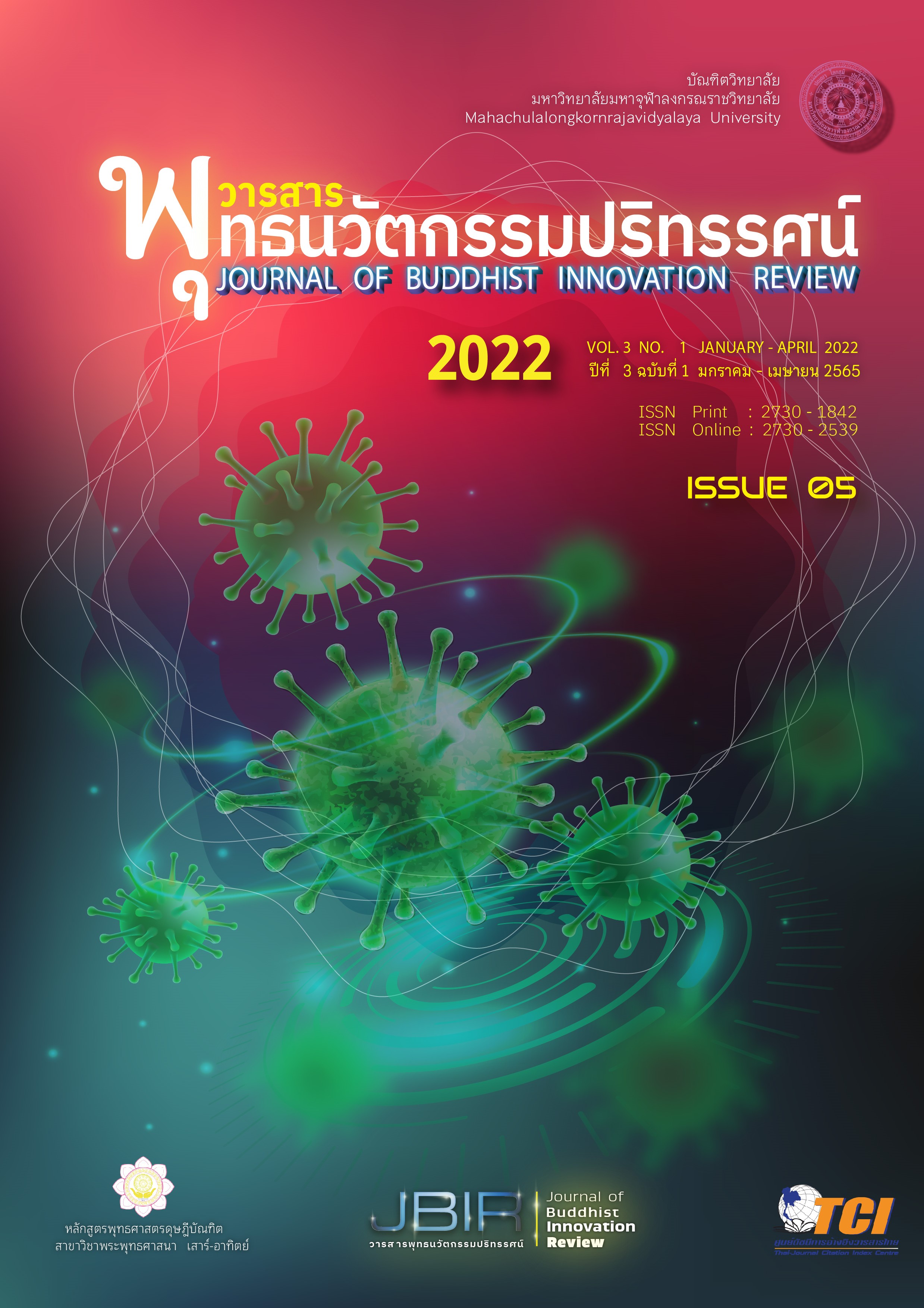Defeating covid-19 with Dhamma in mind
Main Article Content
Abstract
This article is written from my own experiences that my family and me had been through the worst period of the covid-19 as Thailand is facing the third and most severe wave of COVID-19 in the year 2021. This new pandemic has caused society to react with panic to coronavirus. In Buddhism we have a saying the well trained “mind” can bring about long-term changes in mood and levels of happiness and wellbeing. When one has gained happiness from mindfulness, then can send to others around and to the society. The goal of this article is to explain how to adapt Dhamma and mindfulness principal to fight with COVID-19 pandemic, this can be used with any disease in life when people go through the pain, heart disease, kidney disease, cancer, HIVS or dealing with any tough situations in life. Learning Dhamma and mindfulness can help you find ways to stay mentally healthy and your good mental health can lead to a good physical health.
Mindfulness is somewhat like a vaccine to prevent your mind from the spiritual virus, negative emotions. And Dhamma is like a medicine that will heal your soul when you get mentally sick. As a human being we should learn to be mindful in every single minutes. Becoming more aware of the present moment can help us enjoy the world around us more and understand ourselves better. When we become more aware of the present moment, we begin to experience afresh things that we have been taking for granted.
Article Details

This work is licensed under a Creative Commons Attribution-NonCommercial-NoDerivatives 4.0 International License.
เรื่องลิขสิทธิ์/เป็นความคิดเห็นของผู้เขียน
References
เอกสารอ้างอิง
หนังสือ
พระพรหมคุณาภรณ์ (ป.อ. ปยุตฺโต). (2540). พจนานุกรมพุทธศาสตร์ ฉบับประมวลธรรม. พิมพ์ครั้งที่ 11 กรุงเทพมหานคร: มหาจุฬาลง-กรณราชวิทยาลัย.
พุทธทาสภิกขุ. (2549). ธรรมะกับสุขภาพ : ความมีสุขภาพอนามัยทางจิตที่ดี. กรุงเทพมหานคร: สำนักพิมพ์ธรรมสภา.
มหาวิทยาลัยมหาจุฬาลงกรณราชวิทยาลัย, (2539). พระไตรปิฎกภาษาไทยฉบับมหาจุฬาลงกรณราชวิทยาลัย. กรุงเทพมหานคร:โรงพิมพ์มหาจุฬาลงกรณราชวิทยาลัย.
วารสาร
ตฏิลา จำปาวัลย์. (มกราคม–มิถุนายน). ความวิตกกังวลตามสถานการณ์. วารสารพุทธจิตวิทยา 2563; 2 (1): 13.
นภาพัทธ์ งามบุษบงโสภิน. (พฤษภาคม-สิงหาคม). พุทธวิธีเพื่อการดูแลตนเองในสถานการณ์โควิด. วารสารบัณฑิตศึกษาปริทรรศน์ 2563; 16 (2): 56.
สื่ออิเล็กทรอนิกส์
กรุงเทพธุรกิจ. อัพเดท ‘สายพันธุ์โควิด’ ตัวไหนเข้าไทยแล้ว? พร้อมเชค ‘อาการโควิด’ แยกตามสายพันธุ์. วันที่เผยแพร่ออนไลน์. [ออนไลน์] . แหล่งที่มาจาก https://www.bangkokbiznews.com. (วันที่สืบค้น 15 กันยายน, 2564).
คณะแพทยศาสตร์ โรงพยาบาลรามาธิบดี. โรคแพนิก (Panic Disorder). วันที่เผยแพร่ออนไลน์. [ออนไลน์]. แหล่งที่มาจาก https://med.mahidol.ac.th. (วันที่สืบค้น 13 กันยายน, 2564).
ไพเราะ มากเจริญ. ดูแลกายและใจ ตามหลักพุทธศาสนาในสถานการณ์โควิด–19. วันที่เผยแพร่ออนไลน์. [ออนไลน์]. แหล่งที่มาจาก https://www.dmh.go.th. (วันที่สืบค้น 21 กันยายน 2564).
ศรีจันทร์ พรจิราศิลป์. ความเครียดและวิธีแก้ความเครียด. วันที่เผยแพร่ออนไลน์. [ออนไลน์ ]. แหล่งที่มา https://pharmacy.mahidol.ac.th. (วันที่สืบค้น 17 กันยายน, 2564).
อาชว์ภูริชญ์ น้อมเนียน. การป้องกันโรคโควิด-19 ในทัศนะทางพระพุทธศาสนา. วันที่เผยแพร่ออนไลน์. [ออนไลน์] . แหล่งที่มา https://www.silpa-mag.com . (วันที่สืบค้น 21 กันยายน 2564).
Today. ยอดสะสมการติดเชื้อและการเสียชีวิต.วันที่เผยแพร่ออนไลน์. [ออนไลน์]. แหล่งที่มา https://covid19.workpointnews.com. (วันที่สืบค้น 13 กันยายน, 2564).
World Health Organization (WHO). องค์การอนามัยโลก ประกาศ ‘COVID-19 เป็นชื่อทางการไวรัสโคโรนาสายพันธุ์ใหม่ 2019. วันที่เผยแพร่ออนไลน์. [ออนไลน์]. แหล่งที่มา https://www.hfocus.org. (วันที่สืบค้น 12 กันยายน, 2564).


